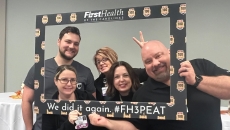Quality and Safety
TimeDoc Health CEO Brian Esterly talks the rise in comorbidities complicating the delivery of care, key social determinants of health issues, healthcare deserts and how health IT can help caregivers aid all of these patients.
Success Stories & ROI
With telemedicine, the time for patients coming out of the ER or a convenience clinic to see a primary care provider has gone from weeks to 24-72 hours. And virtual care has helped the health system achieve a 72% completion rate of Medicare annual wellness visits.
Remote Patient Monitoring
The health system and health plan has seen a 4-times ROI from its durable medical equipment technology work with its healthcare at home program. What's more, Geisinger has reduced overall turnaround time by 83%.
AI & ML Intelligence
Leaders at ONC's annual meeting were asked whether they're confident that federal agencies and the private sector can work together to foster innovation while protecting against bias and safety risks. Here's what they had to say.
AI & ML Intelligence
Leaders from Providence, Humana and VMware offered varied perspectives on their artificial intelligence journeys at the HIMSS AI in Healthcare Forum on Friday.
William Lewkowski, vice president of HCTec, a healthcare consulting firm, discusses a distributed landscape for healthcare and health IT and new technologies leaders at provider organizations must consider.
AI & ML Intelligence
At the HIMSS AI in Healthcare Forum, physician and author Dr. Harvey Castro explored the implications as artificial intelligence expands and increasingly augments clinical decision-making. Providers need to be key players in AI development, he said.
AI & ML Intelligence
Boston Children’s, CVS, Geisinger, UC San Diego and Wellspan are among the 28 providers and payers promising their AI and machine learning models are geared to ensure healthcare outcomes that are "Fair, Appropriate, Valid, Effective and Safe."
The agency said the new strategy is critical to achieving its goal of reducing cancer deaths by 50% and improving the burdens of cancer treatments on patients and families.
Five QHINs have completed the onboarding process, according to ONC, and will now drive higher levels of healthcare information interoperability across the U.S.









